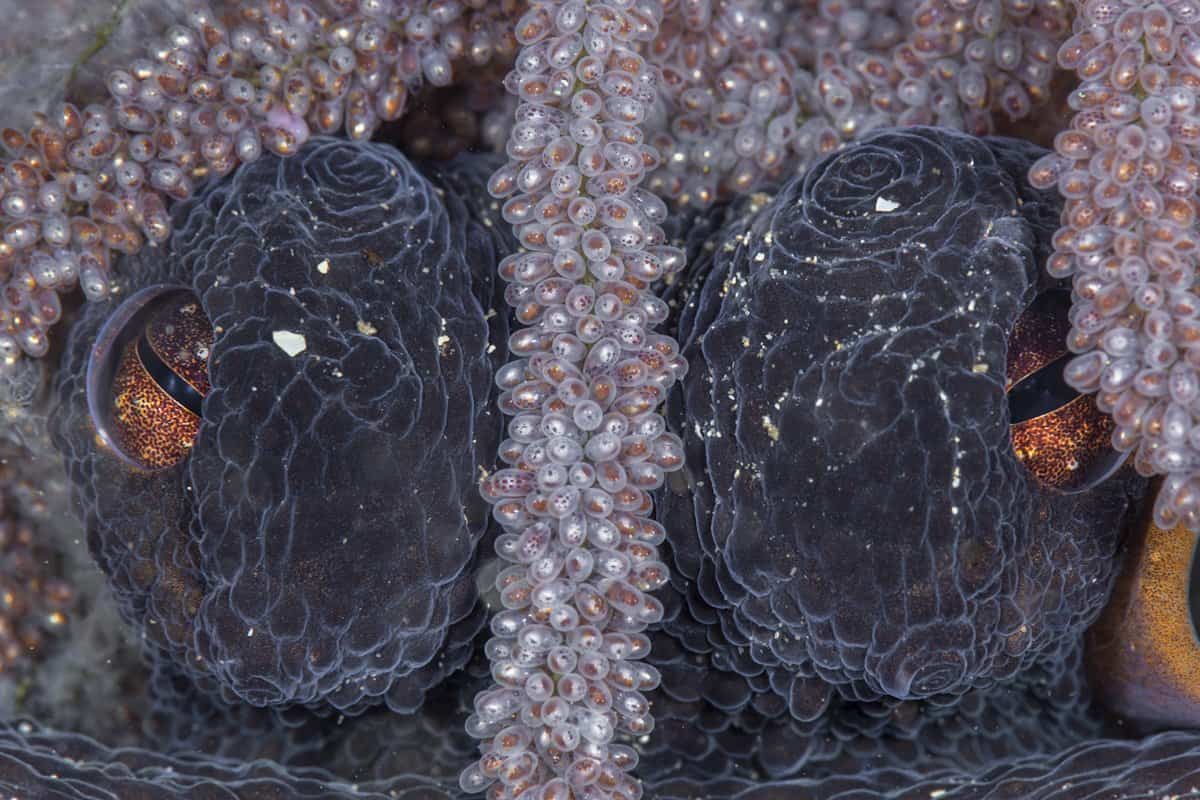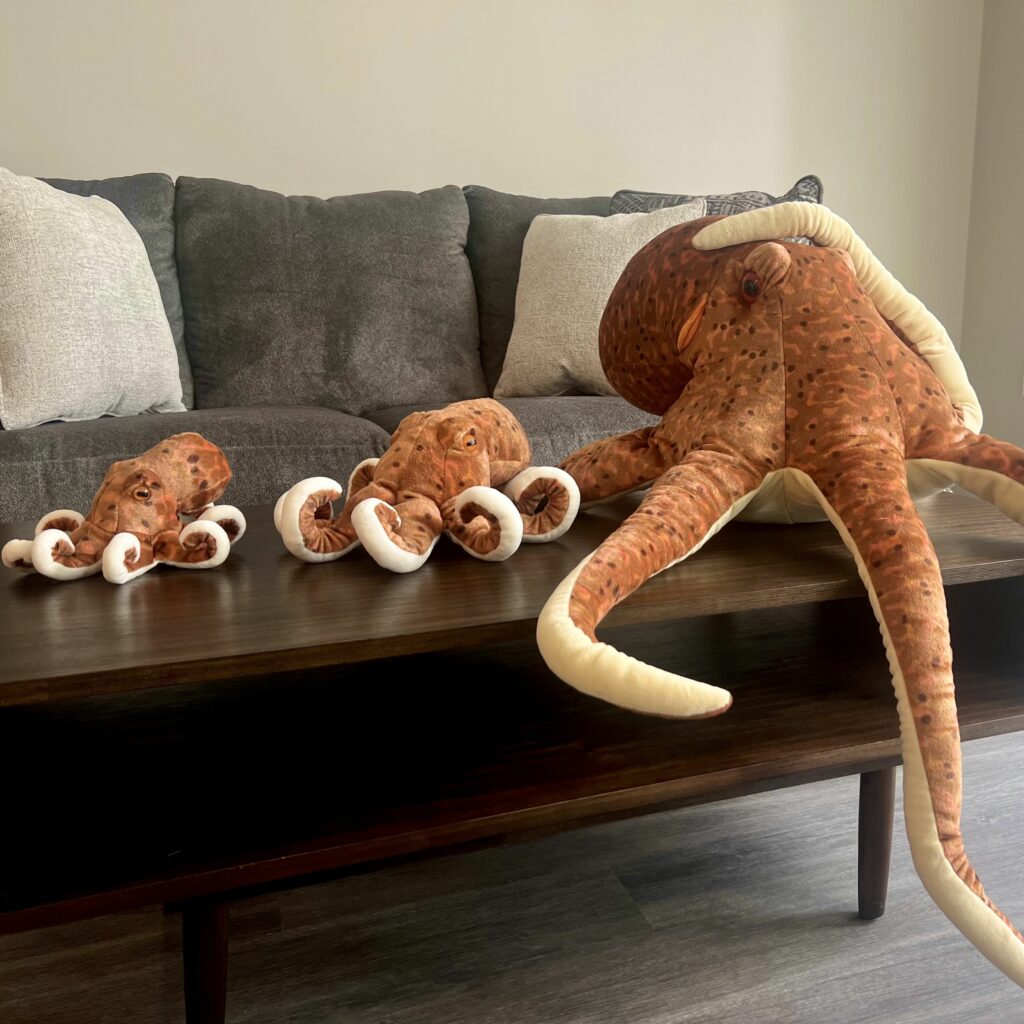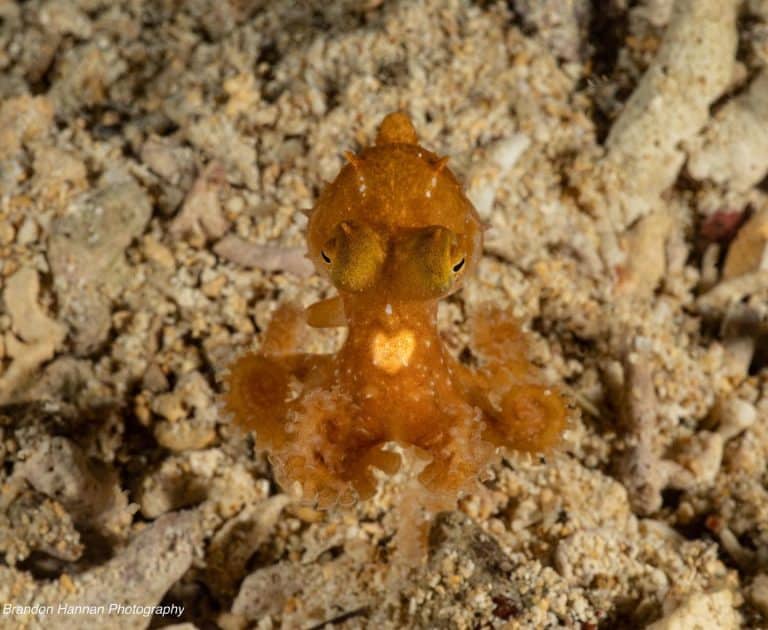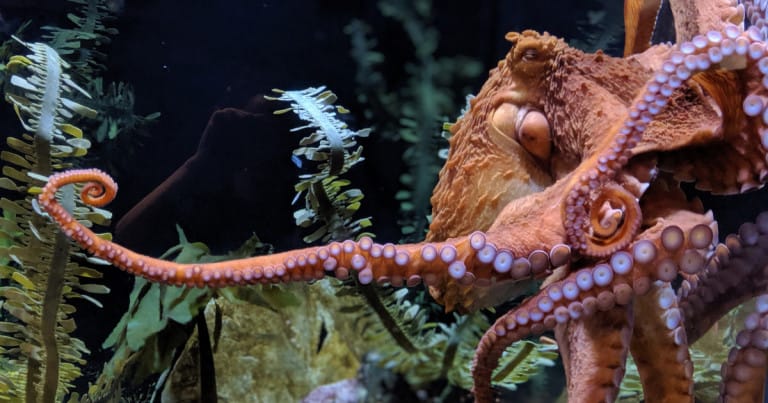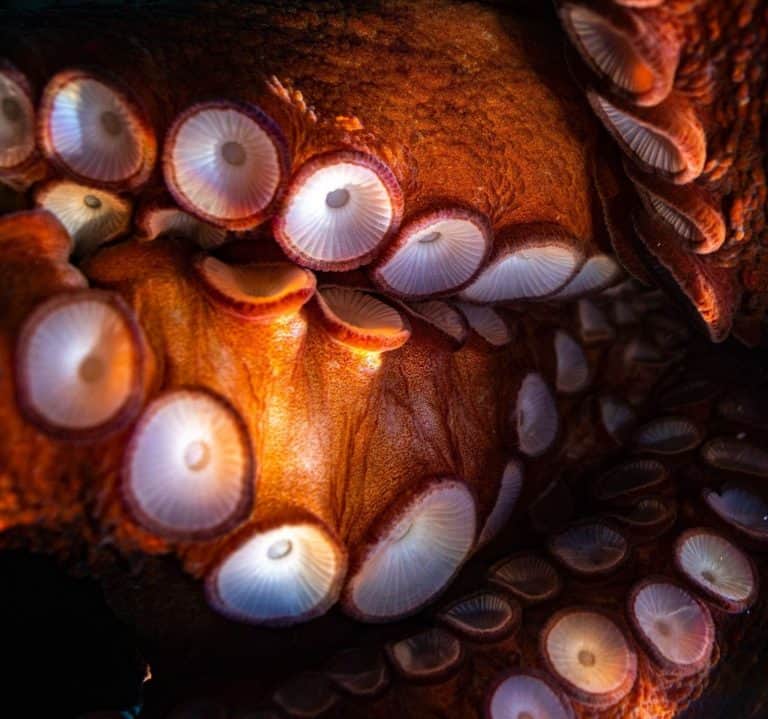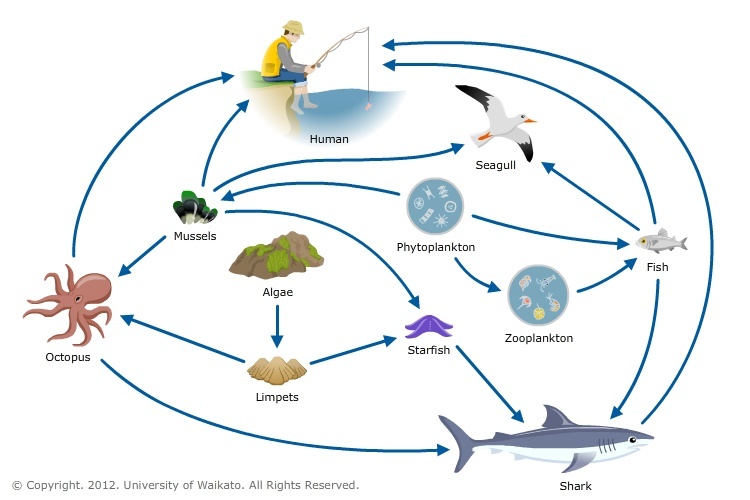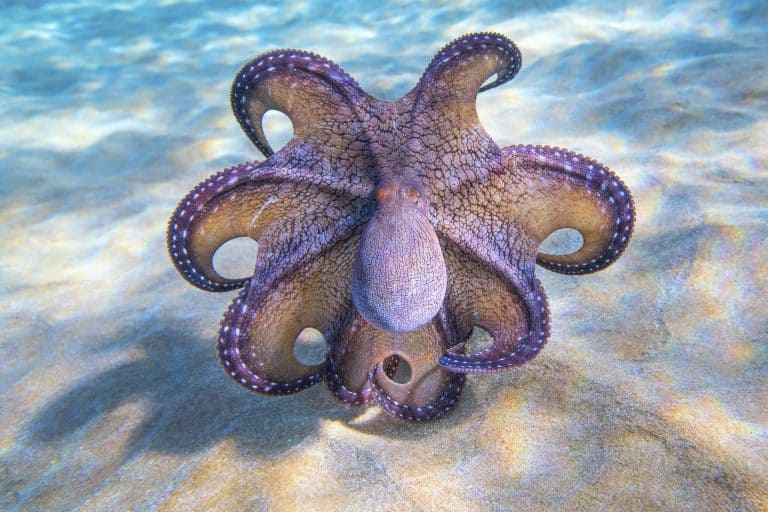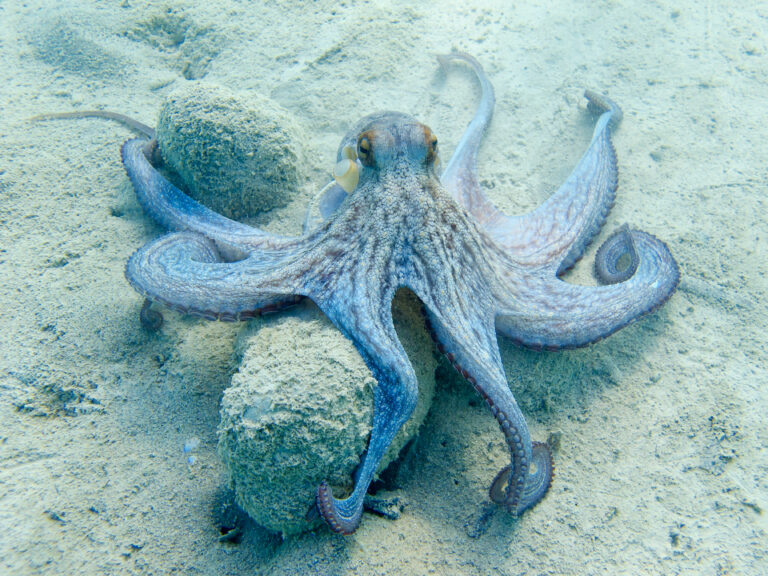Octo-Mom: How Do Octopus Give Birth?
Ever wonder how baby octopuses come into this world? Who takes care of them? How many eggs does a mama octopus lay? Why does she die after her young hatch? You’re about to find out as we dive into how octopuses give birth and care for their precious eggs!
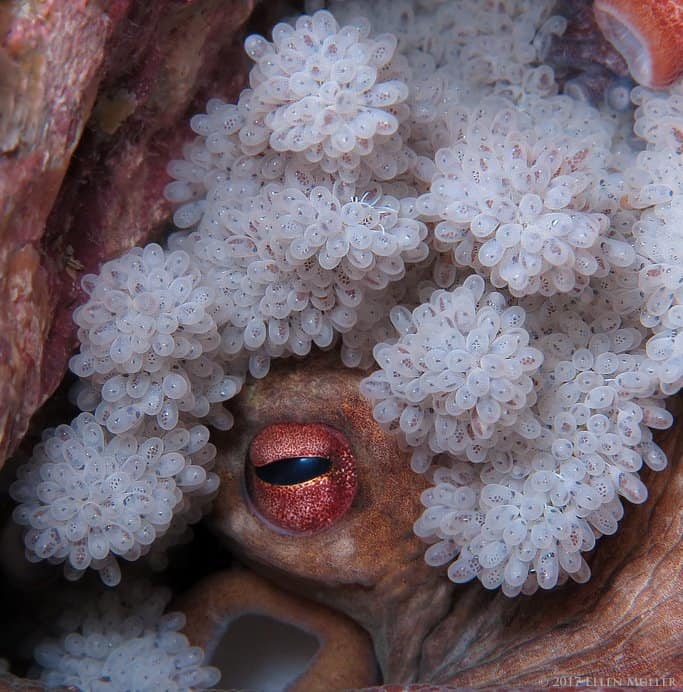
There are many different species of octopus, and how they give birth varies depending on the species. Some lay eggs in a den under rocks or coral reefs where they’ll be safe from predators like sharks and stingrays until their young hatch (about six months later). Most cephalopods will not eat one another as adults, but the younger ones are vulnerable to predators.
In order to protect their young, mama octopuses scour their environment for a safe space to start her ultimate sacrifice: laying her eggs!
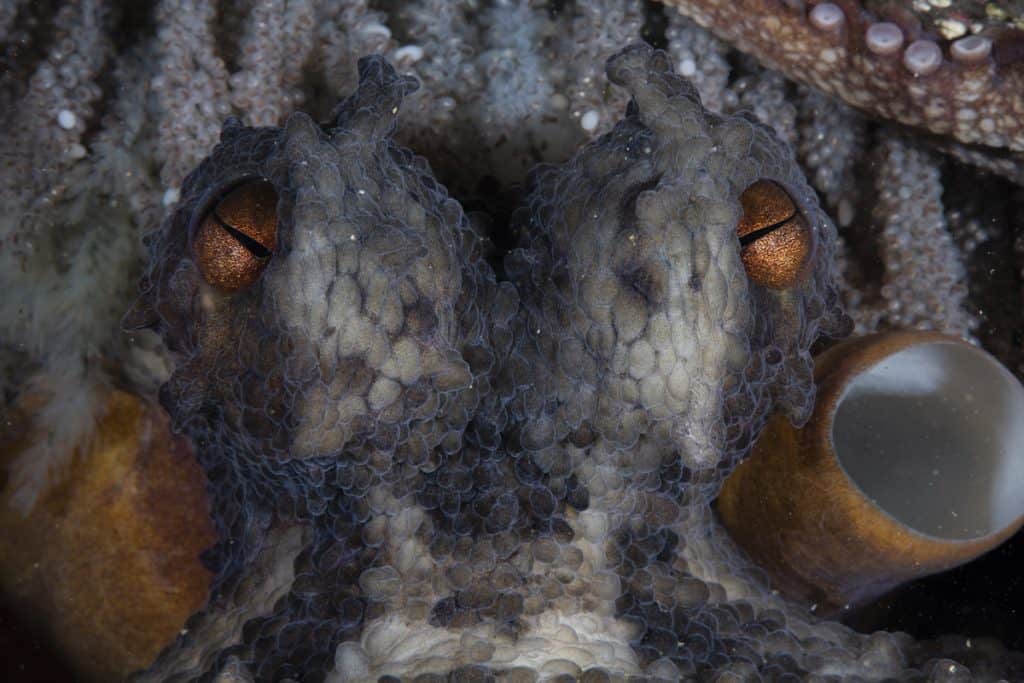
Finding A Home For Her Baby Eggs
Let’s start post-mating when a female octopus begins to look for her ideal den.
Once chosen, the mother octopus will often drag rocks to fortify her den to be sure her babies will be protected from predators.
Later when her space is ready, she will turn upside down and cling to the roof of her den to begin laying her eggs in a protected spot.
How Many Eggs Does An Octopus Lay?
Some octopuses lay hundreds of thousands of eggs at a time, while others will only produce one egg capsule at a time. They can contain up to 100 embryos!
Each egg is created in the ovary and then coated with a nutrient-rich yolk for it to develop in – the translucent, rubbery white sac that is visible to us!
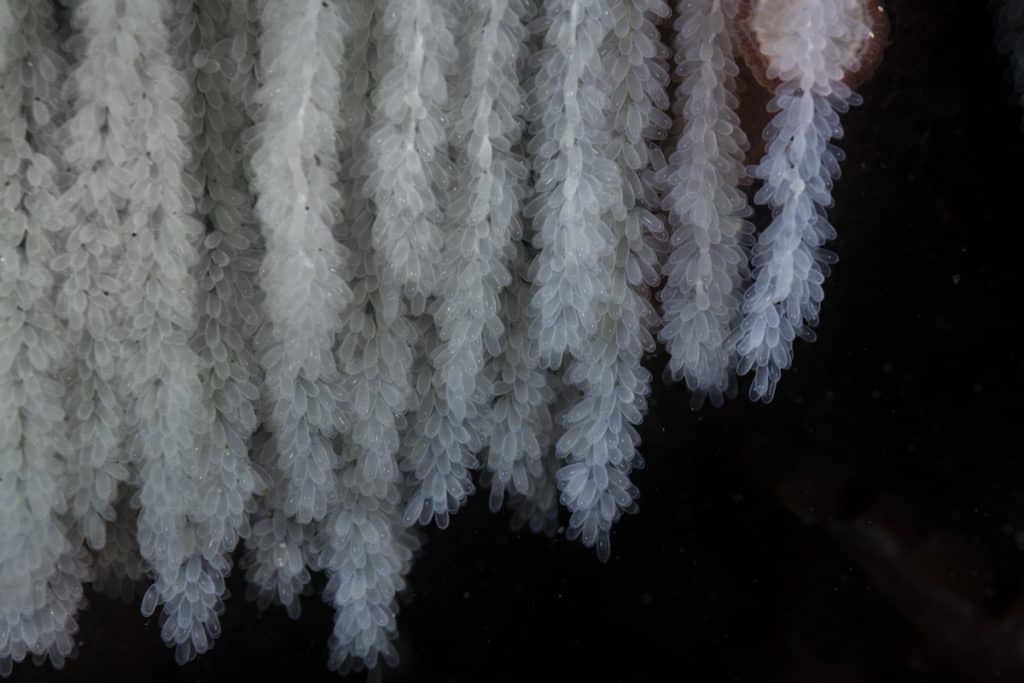
Mama octopus will expel each egg, one by one out of her funnel (or siphon). Then, using suckers near her beak, she painstakingly braids the eggs together into long chains of eggs called festoons (is it just me, or is that a fun word to say out loud?).
When they reach a certain length (around 175 eggs), she will produce an adhesive-like secretion sticking the end of the chain to the top of her den. She will then begin another strand right away or descend to rest and protect her brood, depositing 70,000+ fertilized eggs and braiding around 400 strands (festoons) of eggs.
This takes around 30-40 days!
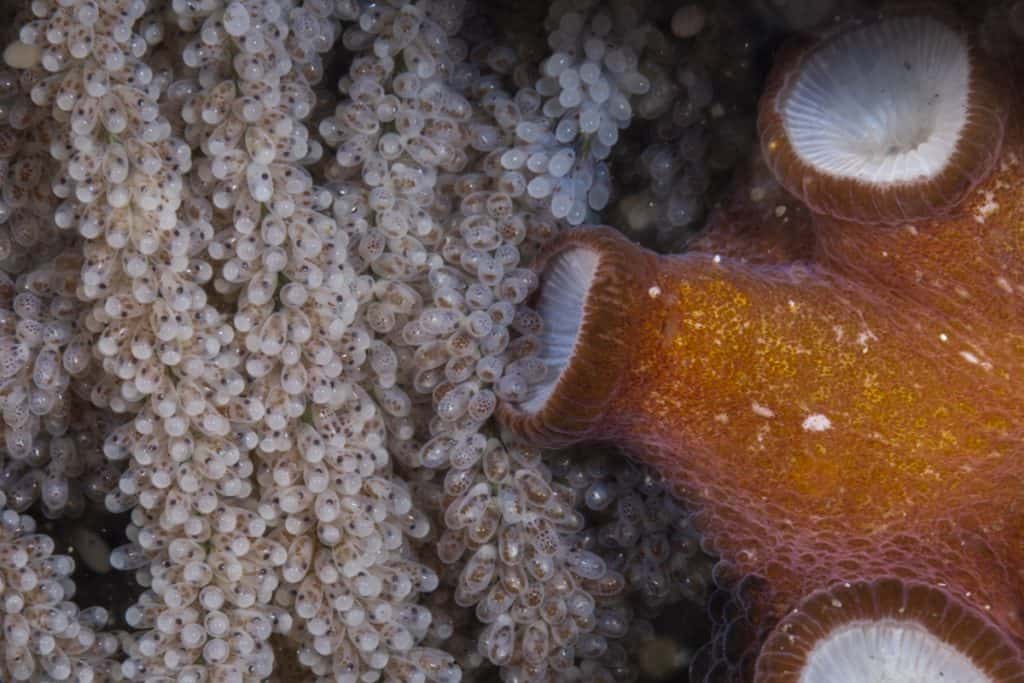
Once all eggs are hanging like a ’70s beaded chain curtain, mothers meticulously clean and waft currents of water over their eggs so they get a constant supply of fresh, oxygenated water.
How Long Does It Take For An Octopus Egg To Hatch?
This is a great question! How long it takes for eggs to hatch is highly dependent on octopus species and water temperature.
For example, the incubation period for the Giant Pacific Octopus (Enteroctopus dofleini) living in cold water is around 6-7 months compared to the Common Octopus (Octopus vulgaris) living in warm water whose young octopuses hatch out after a short 50 days.
🐙 Octopus Fun Fact
Unfortunately, once the babies pop out and start their tiny lives in an ocean filled with big and hungry creatures, the chances of an octopus making it all the way to adulthood are only around 1%.
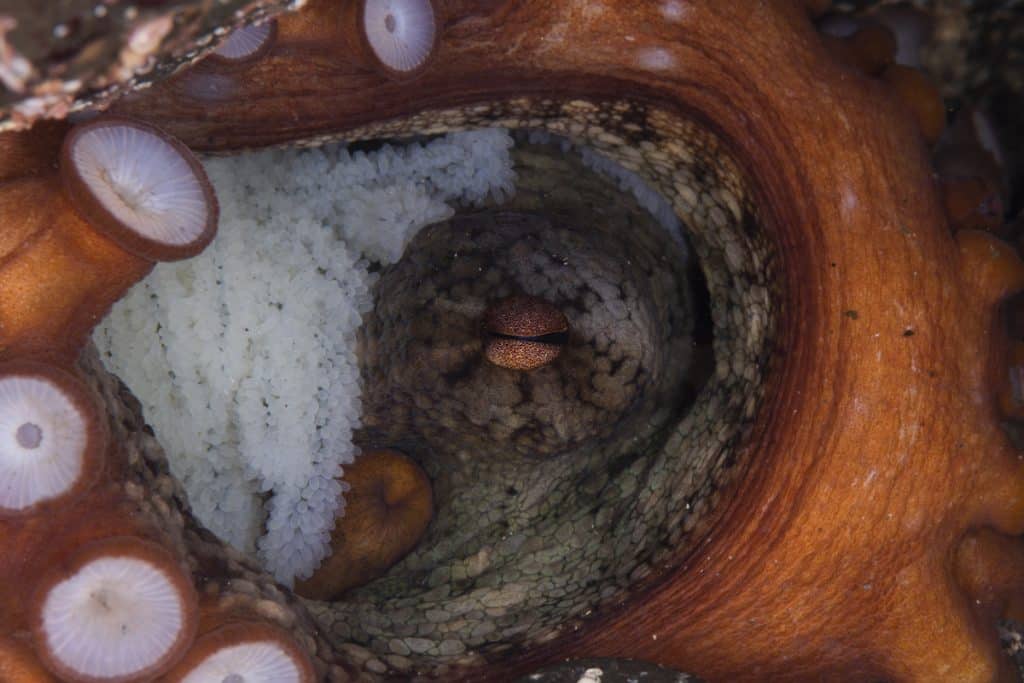
Learn How Different Female Octopus Species Care For Their Eggs!
The whole egg-laying and caring process can get really wacky when we have a look at some of our deep-sea octopus friends!
Abyssal Octopus
The dedicated Abyssal Octopus (Graneledone boreopacifica) cares for her eggs for 53 MONTHS!
Yep, you did the math right…that’s over FOUR YEARS! Way to put all the other octo moms to shame Graneledone boreopacifica.
She can do this because temperatures are near freezing 37०F (3०C), 1,400 meters (4,600 feet) below the surface where she broods her eggs. This keeps her metabolism extremely slow while allowing her to protect her eggs for such an extended amount of time. She doesn’t eat the entire time and hardly moves.
I don’t know about you, but I can barely get from breakfast to lunch without a mid-morning snack!
Putting in this kind of time to care for her eggs does have some benefits. It allows her young to grow bigger, which gives them a greater chance of survival once they hatch.
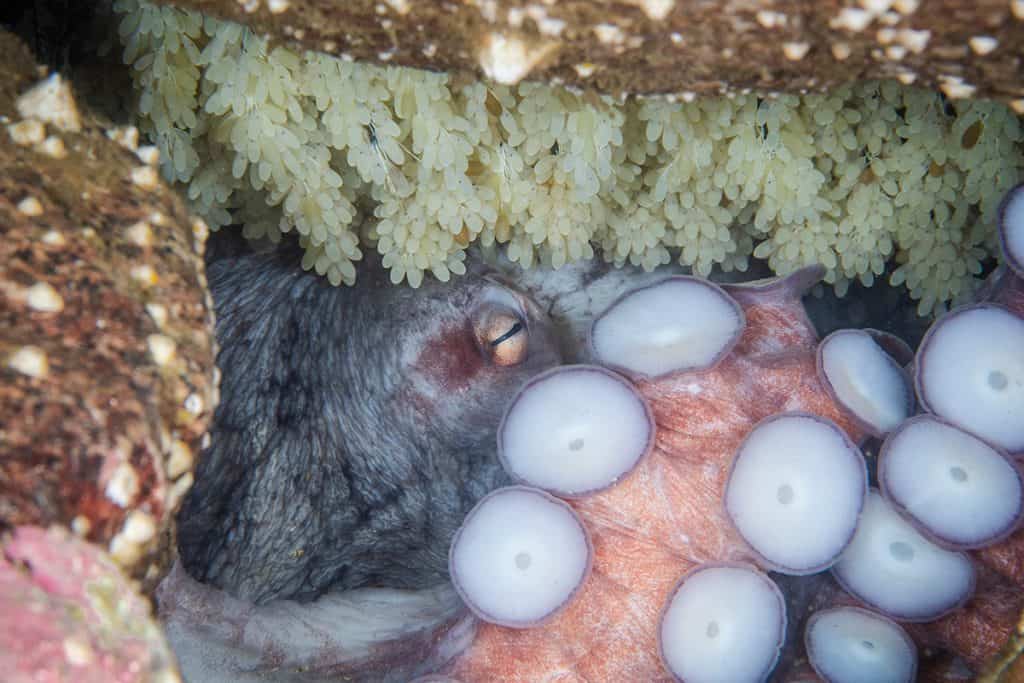
Deep-Sea Octopuses
Shallow-water octopus species usually follow the typical pattern of the female laying her eggs in her den, watching over them until they hatch. They then succumb to starvation and death. This is where deep-sea octopuses differ- they are all about breaking that octopus motherhood mold.
The Dumbo Octopus (Grimpoteuthis sp.) and Vampire Squid (Vampyroteuthis infernalis) can get pregnant WHILE being pregnant. Since finding mates in the deep blue sea isn’t always easy, these two female octopuses hold onto sperm in their mantle and only use it to fertilize their eggs when they come across an acceptable piece of coral or rock that they can attach them to.
The Female Blanket Octopus (Tremoctopus violaceus) makes a calcium carbonate stick to carry her babies on while she drifts through the open seas. Another deep-sea drifter is the Glass Octopus who broods all the eggs inside of her mantle (body) where they hatch directly from her!
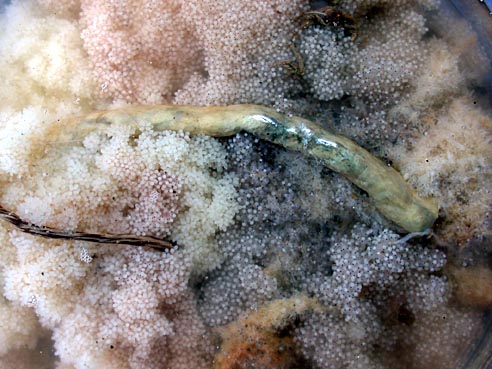
A New Beginning For Baby Octopus Means The End For Mama Octopus
Octopus are semelparous, which means they only reproduce once. This comes at the end of their relatively short lifespan that on average lasts 3-5 years but can be as short as 6 months.
Once a female octopus settles down to care for her eggs, she stops eating. Having exhausted all her energy making sure her babies are well cared for until they hatch, the octopus mother dies. This process is called senescence.
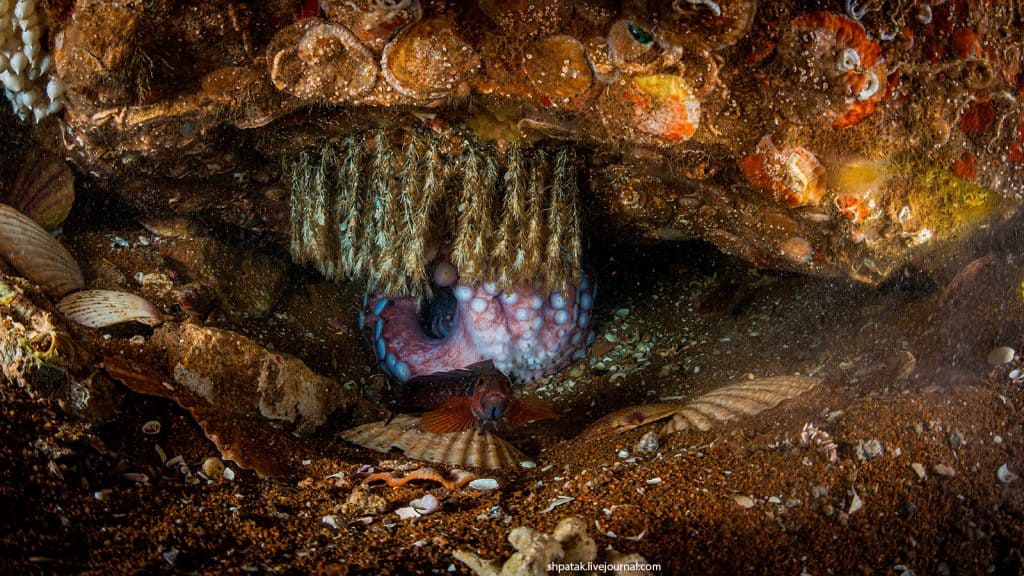
But, Why Do Octopus Stop Eating When They Have Babies?
This puzzled scientists until they uncovered that an octopus’s optic gland, which is located between their eyes, is part of the senescence process. The optic gland is similar to our pituitary gland; A small bean-shaped organ at the base of our brain that tells other glands, which hormones to release and helps regulate growth, blood pressure, and reproduction.
Basically, all of our human urges, along with octopuses, are controlled by a pea-sized organ. A chemical secretion from the female octopus’s optic gland stops her desire to eat during the reproductive process leading to her ultimate demise.
Octopus are essentially pre-programmed to die.
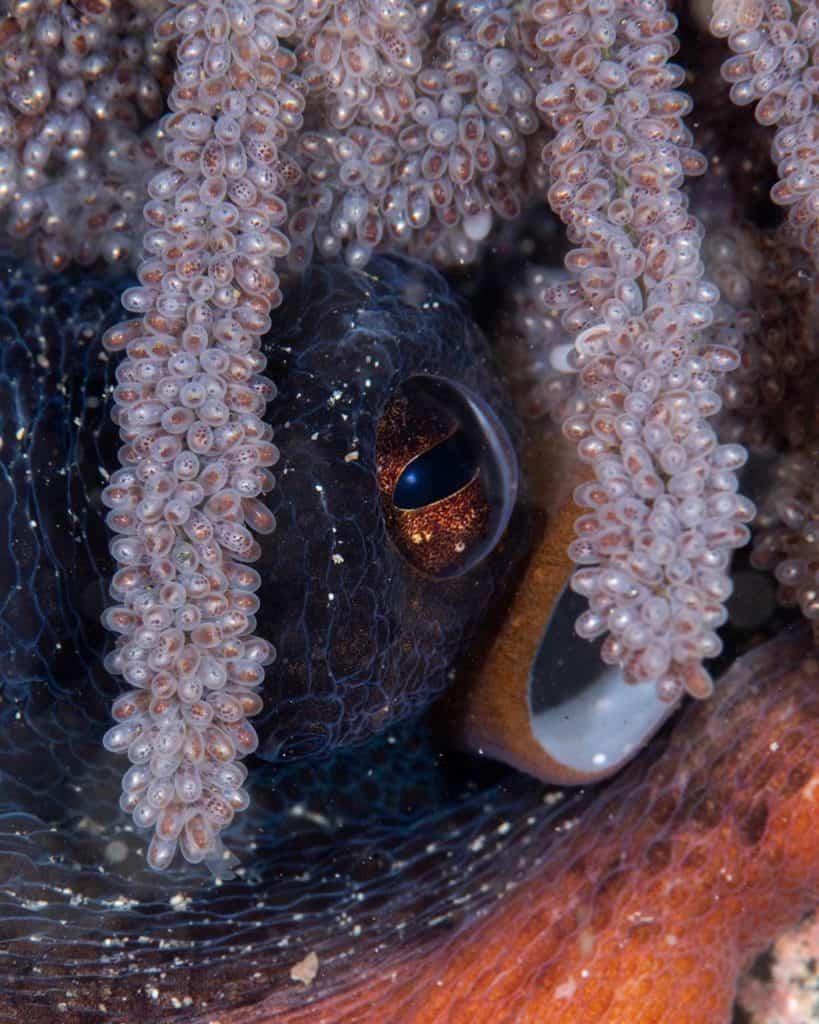
While this may seem sad when viewed through our human lens, an octopus has completed the task which it was meant for: having offspring and passing along their genes. Mission accomplished!
Why stick around after the most important part of their life has been accomplished?
🐙 Octopus Fun Fact
Female octopuses also have cannibalistic tendencies, which scientists have hypothesized could result in them eating their own hatchlings if their hunger wasn’t being suppressed.
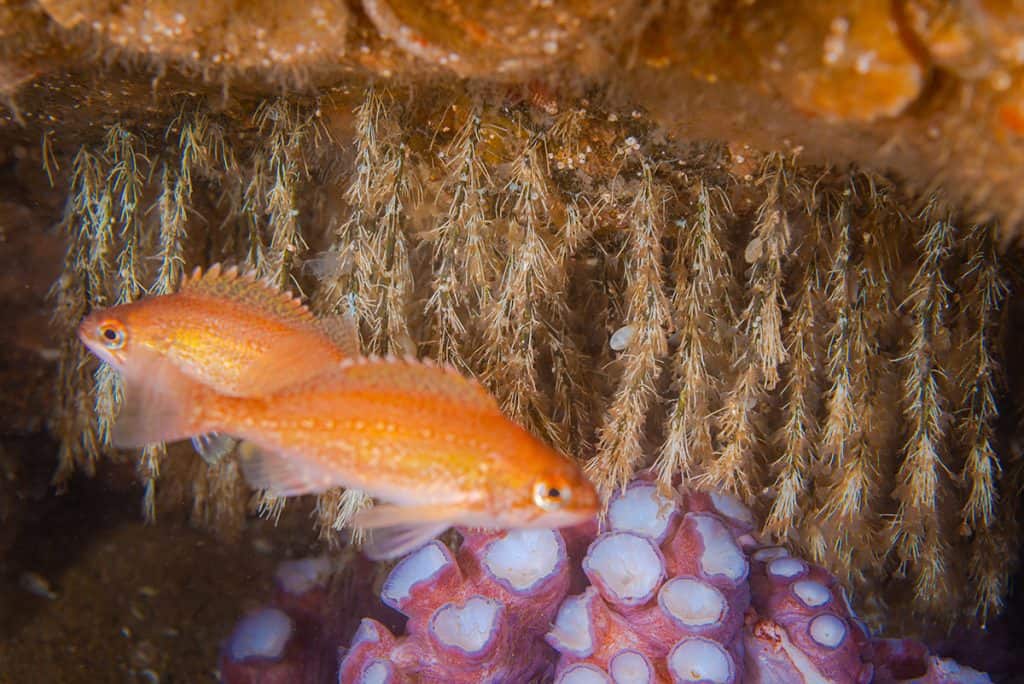
So, Where’s Octo Dad?
If you’re thinking octopus dads fare any better, they don’t. After mating, if a male octopus isn’t quick enough, they are eaten by their mate!
Once the female has what she needs, the male just becomes a big juicy steak in her eyes. To be fair, the female octopus could probably use a protein boost to help fuel her egg-laying and brooding future. Even if the male does manage to escape, they also die shortly after, thanks to their optic gland.
Mama Octopus Giving Birth: The Ultimate Sacrifice
So… how do octopus give birth? It’s quite simple- They completely sacrifice themselves.
And, while an octopus mom will never be able to see her babies grow up, she gives up everything, including her life, to make sure they are well cared for until they hatch. For these devoted moms, the miracle of life sure is bittersweet.
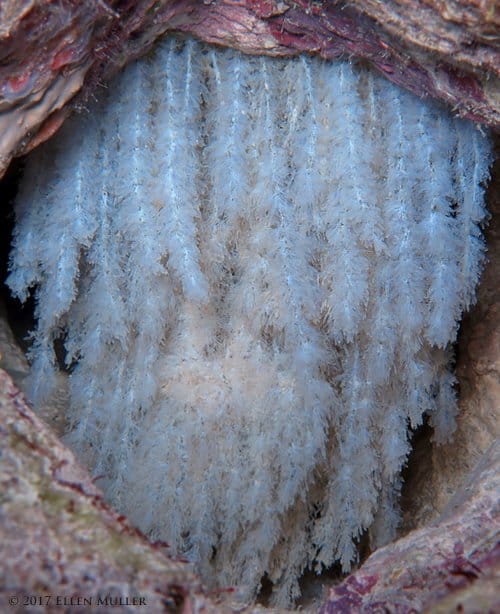
If you want to educate yourself some more about all sorts of different cephalopods, take a look at our encyclopedia. Or, what we call it, our Octopedia!
Connect with other octopus lovers via the OctoNation Facebook group, OctopusFanClub.com! Make sure to follow us on Facebook and Instagram to keep up to date with the conservation, education, and ongoing research of cephalopods.
✨Click here to Adopt an Octopus!✨
More Posts To Read:
If you enjoyed learning about how octopuses give birth, we recommend taking a look at some of these other profiles:
- Top 5 Smallest, Teeniest, Tiniest, Octopus Species!
- 5 Blue-Ringed Octopus Facts That’ll Leave You Shook!
- Maori Octopus Facts: One Of New Zealand’s Largest Species!
- 5 Awesome Dumbo Octopus Facts (The Cutest Octopus Ever!)
- 7 Fun Facts About The Majestic Mimic Octopus!
- 9 Giant Pacific Octopus Facts That Will Blow Your Mind
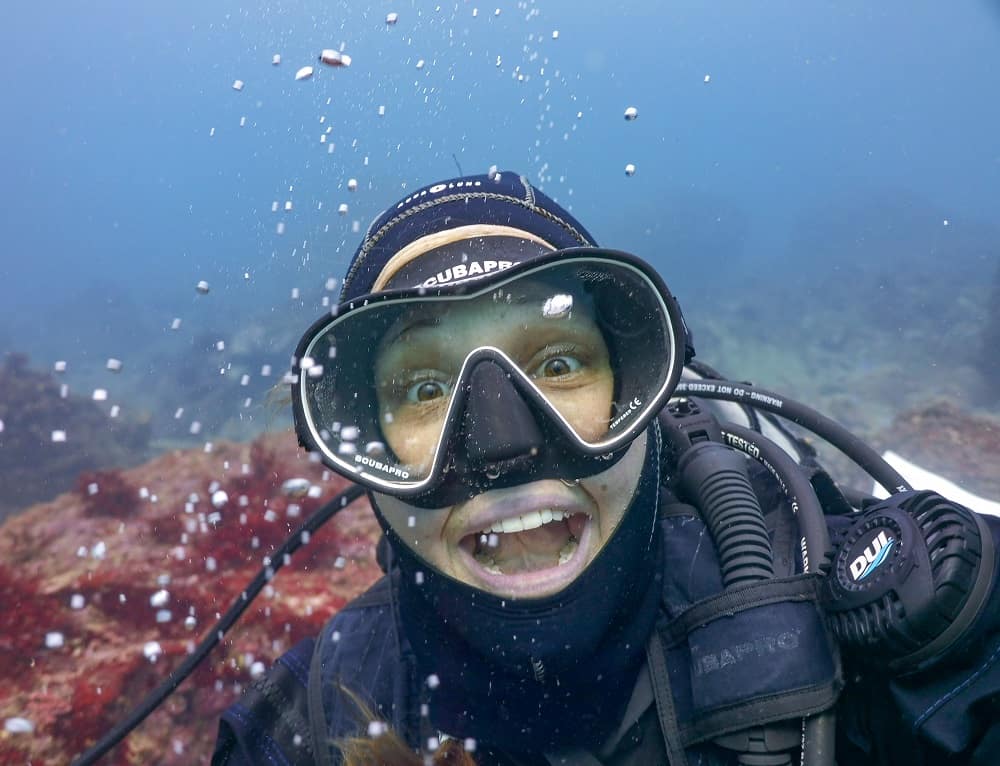
Corinne is a biologist with 10 years of experience in the fields of marine and wildlife biology. She has a Master’s degree in marine science from the University of Auckland and throughout her career has worked on multiple international marine conservation projects as an environmental consultant. She is an avid scuba diver, underwater photographer, and loves to share random facts about sea creatures with anyone who will listen. Based in Japan, Corinne currently works in medical research and scientific freelance writing!
